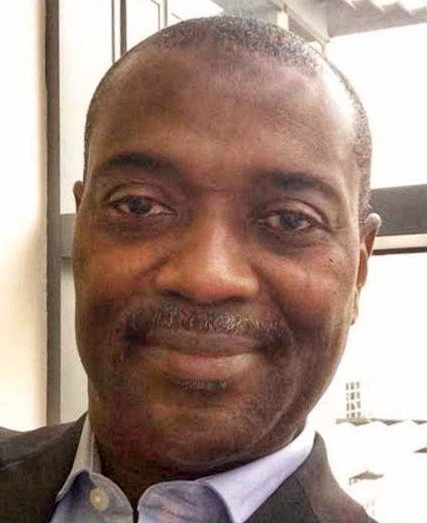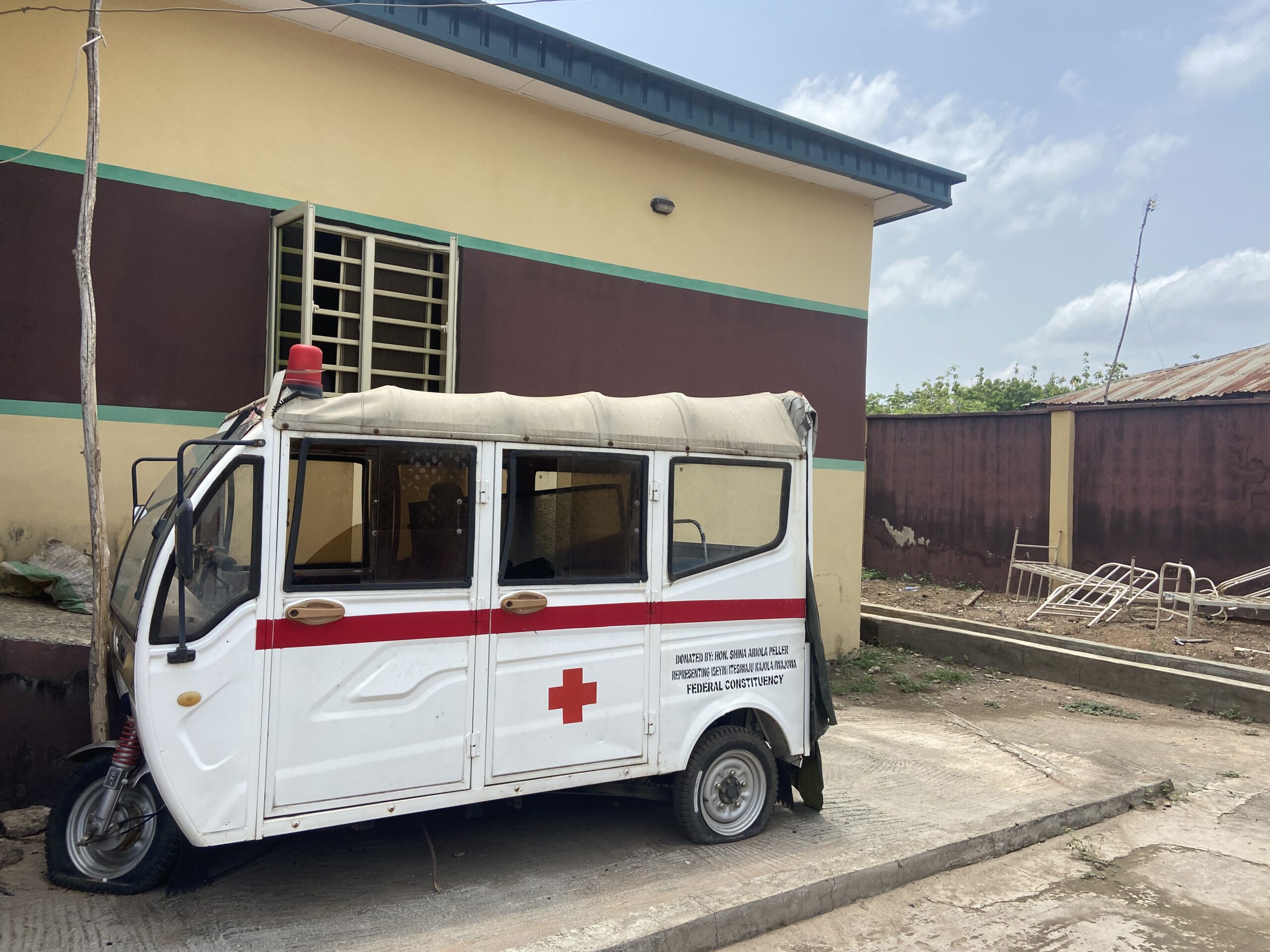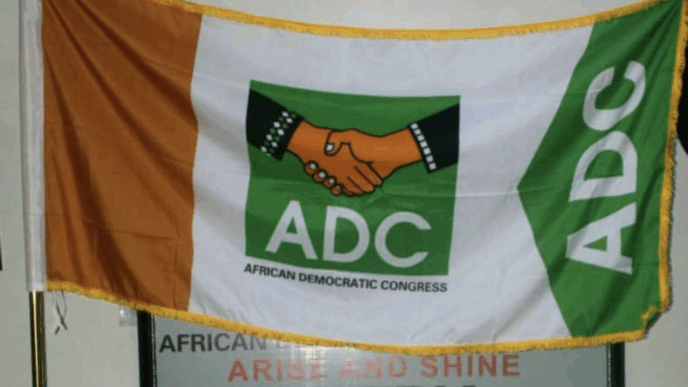A broken ambulance parked in front of the primary healthcare in Ipapo community, Oyo state
Previously, I have argued that Nigeria’s path to lasting change rests on four foundational pillars: education, healthcare, the rule of law, and electricity. While all are essential, a robust healthcare system is a non-negotiable prerequisite for national well-being. Everyone has a vested interest in health, which is why the Yorubas say, “Ìléra loògùn ọrọ̀” and “Ẹni tóní àláfíà, ohun gbogbo lóní” which translates to “Health is wealth” and “He who has good health has everything” respectively. Beyond being a personal concern, a strong healthcare sector is a powerful engine of economic prosperity and social stability, creating a productive workforce, fuelling job creation, and strengthening national security. Though healthcare is a specialised field, it is a subject in which everyone holds an opinion or has a personal experience to share. Even without professional medical credentials, I am deeply invested in this conversation, and so, with that in mind, let’s begin.
A nation’s investment in healthcare is, first and foremost, an investment in its human capital. When citizens have access to quality care, they are more likely to be free from debilitating illnesses, enabling them to participate in the workforce and contribute to economic prosperity and social stability, creating a productive workforce, fuelling job creation, and strengthening national security. This increased productivity creates a powerful multiplier effect, as the healthcare sector itself is a significant source of employment, from doctors and nurses to researchers and administrative staff. It also stimulates growth in related fields like pharmaceuticals and medical technology. Furthermore, a robust healthcare system helps reduce poverty by protecting citizens from catastrophic medical expenses, enabling them to save money and invest in their future. Beyond its direct economic impact, a strong healthcare system is a critical component of national security. As the COVID-19 pandemic demonstrated, a well-funded public health infrastructure is essential for responding to widespread outbreaks and limiting economic and social fallout. An equitable healthcare system also fosters social cohesion by reducing health disparities and building trust between citizens and their government. This capacity to protect its population, once achieved, would then allow Nigeria to project its influence globally by providing humanitarian aid and medical assistance to other nations.
The Unhealthy Reality: Challenges and Strengths
While Nigeria has made some notable strides, its healthcare system remains largely strained and underfunded. Available data paints a clear picture of a system under immense pressure. Key health indicators remain far from ideal, with a very high maternal mortality ratio of 993 deaths per 100,000 live births in 2023 according to World Bank data, and similarly high infant mortality rates at 114 per 1,000 live births in the period leading up to February 2024. Life expectancy, while showing some improvement, lags behind the global average estimated at 63.4 years in 2021-2024 data.
These poor outcomes are largely due to deep-seated systemic issues. Government funding for healthcare is persistently low, falling well short of the 15% target set by the African Union’s Abuja Declaration of 2001. This forces most Nigerians to pay for care out-of-pocket, creating a significant financial barrier to care. The country also faces a severe shortage of healthcare professionals due to a crippling “brain drain,” where skilled medical workers migrate abroad for better pay and working conditions. The doctor-to-patient ratio is approximately one doctor per 4,000-5,000 patients, far below the WHO’s recommendation of one doctor per 600. Much of the country’s healthcare infrastructure is also underdeveloped and poorly maintained, with many public hospitals lacking essential modern equipment and facing chronic shortages of drugs and medical supplies. These challenges create a widespread sense of dissatisfaction among both healthcare workers and the public, often leading to strikes and financial anxiety. The current state of healthcare in Nigeria fuels a staggering outbound medical tourism industry, costing the nation over $1 billion annually. Redirecting these funds could provide a significant financial boost to the domestic health sector.
Advertisement
Despite these significant challenges, Nigeria’s healthcare sector is not without its strengths, particularly in policy reform, public health initiatives, and leveraging private sector partnerships. The National Health Insurance Authority (NHIA) Act of 2022 is a landmark development, making health insurance mandatory and laying the groundwork for universal health coverage. Driven by persistent advocacy from civil society organisations, the Nigerian National Health Act of 2014 mandated a landmark change: the allocation of at least 1% of the Consolidated Revenue Fund (CRF) to the Basic Healthcare Provision Fund (BHCPF). First implemented in the 2018 budget, this legislation was designed to fundamentally improve access to healthcare services across the country. Nigeria has also demonstrated a strong capacity to tackle major public health challenges, such as becoming wild polio-free in 2020. This monumental achievement showcased its ability to mobilise resources and conduct massive immunisation campaigns. The nation’s commendable response to the COVID-19 pandemic also showcased its ability to coordinate a national response and scale up testing capacity. By enacting the Sugar-Sweetened Beverage (SSB) tax on June 1, 2022, the government created a dual-purpose policy: it aimed to generate revenue for health initiatives while simultaneously improving public health by discouraging consumption of sugary drinks. This tax serves as a powerful tool to combat rising obesity rates and the prevalence of diet-related diseases like diabetes and heart disease. Public-Private Partnerships are also increasingly being used to bridge infrastructure and service gaps.
The Health Insurance Paradox
Nigeria’s health insurance system, though a cornerstone of its reform efforts, has faced significant challenges. The NHIA, which aims to provide affordable healthcare for all, has had extremely low coverage, primarily benefiting the formal sector while leaving a vast majority of the population in the informal sector uninsured. This low penetration is the direct cause of the country’s heavy reliance on out-of-pocket payments. While private Health Maintenance Organisations (HMOs) offer an alternative, their uptake is limited by affordability issues (many Nigerians are simply unable to afford any extra costs/payments) and a general lack of public trust. Moreover, many Nigerians are either unaware of the benefits of health insurance or harbour a deep-seated mistrust of insurers, fuelled by a history of unpaid claims and a lack of transparency. For those who are insured, this distrust is compounded by common frustrations: inefficient service, long wait times, and poor facilities. To make matters worse, some hospitals demand additional out-of-pocket payments for services that should be fully covered, further eroding confidence in the system. The NHIA Act of 2022, while a landmark step toward Universal Health Coverage, lacks a critical enforcement mechanism. Without this crucial component—which would include penalties for non-compliance, robust systems for premium collection, and proactive public awareness campaigns—the Act’s core objectives of providing financial security, reducing out-of-pocket spending, and building social resilience will likely remain unrealised. Consequently, the ultimate success of the health insurance system hinges on effective implementation and enforcement.
A Path Forward: A Multi-Faceted Strategy
To make meaningful progress, Nigeria must adopt a multi-faceted approach that addresses these systemic issues with pragmatic, low-cost solutions. A workable strategy should focus on five key areas: reimaging our hospitals, innovative health financing, primary healthcare revitalisation, addressing the human resources crisis, and the strategic use of technology.
Advertisement
1. Reimagining Our Hospitals
The federal government must urgently revitalise teaching hospitals and federal medical centres (FMCs). Once the pride of the nation, drawing patients beyond our shores, they have become a source of repulsion. Every state in the nation should strive to have at least one world-class hospital in its capital city—a facility that transcends the standard “General Hospital” and offers truly modern, state-of-the-art care. Every state can afford this. Wealthier states, in particular, should aim for at least two. States with medical schools should already have top-tier teaching hospitals to train the next generation of professionals. We must hold our governors accountable and demand action. Furthermore, with their newfound financial autonomy, local governments now have the means and the responsibility to build their own local and community hospitals, modest and efficient. This should become a mandatory nationwide requirement, ensuring that quality healthcare is accessible to every citizen, not just those living in urban centres.
2. Innovative Health Financing
Given Nigeria’s poor economic conditions, diversifying funding sources is paramount. The government must effectively expand the formal sector insurance base and develop tailored, community-based models for the informal sector. At the risk of entering controversial territory, the nation should also consider introducing “Sin Taxes” on products like tobacco and alcohol, with the revenue ring-fenced to fund the healthcare system directly. After all, Nigeria is a heavily religious country; let us see the preponderance of citizens put their money where their mouth is, as well as see religious leaders promote this value. If people choose to smoke and drink heavily, they should pay a premium on those luxuries to help the health sector. Furthermore, engaging the private sector through Public-Private Partnerships (PPPs) could also help bridge infrastructure and service gaps. This approach leverages private-sector efficiency and investment to enhance public services without the government bearing the full cost of building new facilities. The success of this model in other sectors, such as roads, bridges, transportation and housing, suggests it can also be a viable solution for healthcare. However, careful contract design, clear performance metrics, and robust regulatory oversight are essential to ensure the private partner’s interests align with the public’s need for accessible and affordable healthcare.
3. Strengthening Primary Healthcare (PHC)
Strengthening PHC is the bedrock of universal health coverage. The late Olikoye Ransome-Kuti, as Nigeria’s health minister, strongly advocated and worked on this throughout his period as minister, and I share his position. The federal, state and local governments, along with local communities, should focus on upgrading and equipping existing PHC centres with essential drugs and equipment. Perhaps, there might be a need to tweak our laws to share and harmonise these responsibilities among the layers of government. Investing in and empowering a new cadre of Community Health Workers (CHWs), who can provide preventive care and basic treatment, would also help overcome geographical barriers to care, following successful models in countries like Ethiopia and Rwanda. This model is cost-effective and helps overcome the geographical barrier to healthcare access.
4. Addressing the Human Resources Crisis
To address the persistent brain drain, a complete salary overhaul is essential, and while it may be economically unfeasible in the short term, Nigeria can implement more pragmatic solutions. This includes improving working conditions and supplementing remuneration by providing housing allowances and a more stable work environment. Offering subsidised or free opportunities for continuous professional development can also reduce the “push factor” for migration. Additionally, task-shifting and task-sharing, by empowering nurses and CHWs to handle some basic duties traditionally performed by doctors, would help the system become more efficient.
Advertisement
5. Leveraging Technology
Finally, leveraging technology can help overcome geographical barriers and improve efficiency, even with limited resources. Implementing a national Telemedicine and e-Health programme could connect remote PHCs with doctors in urban hospitals, allowing for remote consultations and expert second opinions. Utilising mobile phones for public health campaigns and tracking patient data is another low-cost but high-impact solution. And if Rwanda can use medical drones to deliver essential supplies to hard-to-reach areas, surely Nigeria can as well, perhaps through Public-Private Partnerships with drone technology companies. While Nigeria is a long way from achieving its healthcare ambitions, these steps offer a clear path forward. The impact of any policy is ultimately measured by its effect on the lives of people, and with the right political will and strategic focus, meaningful progress is within reach.
A nation’s healthcare system is intrinsically linked to the patriotism of its citizens. The United Kingdom’s National Health Service (NHS), which provides universal, free-at-the-point-of-use healthcare, is widely admired. In contrast, the United States, while home to some of the world’s best medical facilities, does not offer the same level of accessibility to all citizens. Nigeria, along with many other developing nations, faces a significant challenge in balancing free access with paid healthcare options to serve its diverse population. Finding this equilibrium is crucial. Ideally, healthcare should be accessible to all, with some services being means-tested and those with greater financial capacity contributing more.
Now, having explored the bedrock of health, I will dedicate my next discussion to another vital pillar: the rule of law, and its fundamental importance for national development.
Gbadamosi can be reached at [email protected]
Advertisement
Views expressed by contributors are strictly personal and not of TheCable.









